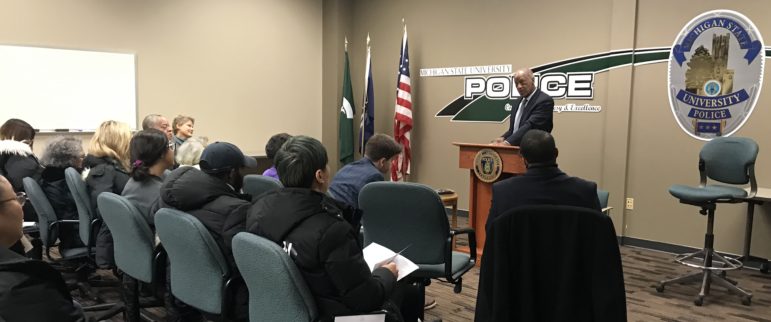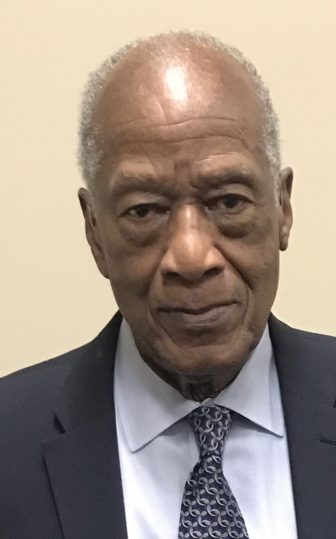
Lea Mitchell
Dr. Robert Green describes learning from the Rev. Dr. Martin Luther King Jr. and integrating the City of East Lansing
Dr. Robert L. Green, who has a doctorate in educational psychology from Michigan State University, a B.A. and M.A. from San Francisco State College, and who worked as an education director of the Southern Christian Leadership Conference with King, shared his story. He stressed the importance of education, respect and how to overcome fear.

Lea Mitchell
Dr. Green at his speech in East Lansing on January 25th.
“People denied me because of the color of my skin, like I had control over that. But I learned a smile and a little bit of love can get you a long way,” Green said. “It’s the way you talk to people.”
Calm in the face of a death threat
Green said he will never forget one experience he had with King. They were at a gas station with others when a white gas station attendant, James Belk, approached their car. Belk pulled out a gun and put it in King’s face while saying things like “prepare to die.” Without hesitation, King fearlessly responded, “Brother, I love you.”
King aborted his own assassination that day and infused the quality of overcoming fear in Green. He showed Green he must fight his fear and protest nonviolently, even while frustrated.
“One thing Dr. King always said to me was to be calm, patient and think,” Green said. “Dr. King was a person I admired and respected. He was against racism, war and poverty. He helped me see things differently in ways I don’t think I would have if I hadn’t known him.”
There was fear in the black community when Green was growing up and it wasn’t any secret. King told him he shouldn’t have fear because “one is not fit to live, if he doesn’t have something to die for.”
Integrating East Lansing
Winning equal treatment was a challenge for families of color. Green said people would deny him job opportunities despite his scholastic achievements and, when traveling, some hotels would deny him service. These barriers could tear some individuals down, but not the Green family. He was determined to overcome this adversity and his family became the first to integrate East Lansing.
Green, made sure his kids took school seriously. His son, Robert Green, a lawyer who goes by Vincent, was at the Jan. 25 speech and said his dad instilled education into him and his brothers at a young age. All have college degrees.
“We came from a family that really believed in education. We have a bunch of law degrees and Ph.Ds in our family and that was the biggest thing that impacted me and my brothers,” Vincent Green said.
A message that touches people
The way Dr. Green viewed King is the way many people view Dr. Green today. His message touched Michigan State sophomore Katie Montroy, who attended the talk at the MSU Police Station. The talk was organized by the MSU Police Inclusion and Anti-Bias Unit, which Sgt. Florene McGlothian-Taylor leads, with support from the College of Communication Arts and Sciences Inclusiveness Committee. Geri Alumit Zeldes, Ph.D.,leads the committee.
“When going to this event, I thought it was just going to be an event that stated the facts, but Dr. Green was really personable, and it gave me a better picture about his points. I got chills listening to the things he went through and how successful he is now. He has experienced a lot of hatred and to still have the desire to spread love to others … It truly is inspirational,” Montroy said.
Not only does Green share his story with others, but he is doing a project proposal with James Madison College student, Edmund Rushton.
Rushton said he met Green in October of 2017 and they are working on a policy proposal to send to Detroit Mayor Mike Duggan or Abdul El-Sayed, who ran for governor. The proposal calls for abolishing occupancy clauses in private prison contracts.
Rushton said Green, “has had an immense impact on my life. He is a very sharp man. Three years ago I was working for the Republican party helping with their presidential election, but some things happened” that disillusioned him.
Not all of our history is in the books
According to Rushton, Green has taught him to be curious and to look into history. Green told him he should understand the history of his country because many incidents are left out in schools.
“He taught me if there was a vague history on an American institution, then I should look into it myself because many times key details are left out and people are unaware. Depending on where you grow up, people tend to have different angles than others, which is why we need to learn both sides of the spectrum,” Rushton said.
Nearing the end of the speech, the audience was still engaged and smiling. “Hearing this speech makes me want to share the message that going to class is a privilege and we shouldn’t take it for granted,” Montroy said.
Green is now retired, but continues to work for education and social justice. Green has written many books and his latest, “At the Crossroads of Fear and Freedom: The Fight for Social and Educational Justice,” shows readers what to do when freedom, fear, equality and education overlap.
Green wants to continue to be an inspiration to anyone who comes his way.